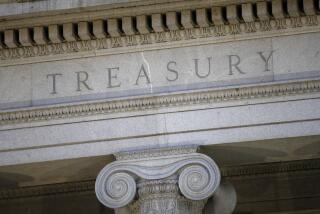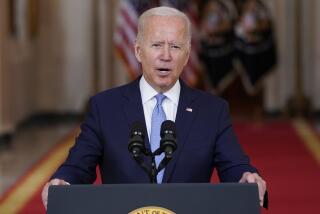U.S. Accounts Are Funding Terrorists : Private Libyan Deposits in American Banks Used, Top-Secret Report Says
- Share via
WASHINGTON — Funds from Libyans’ private bank accounts in the United States, which were not affected by President Reagan’s order freezing the North African nation’s official bank deposits here, are being used to pay for international terrorist activities, according to a top-secret U.S. intelligence report.
Reagan Administration officials with access to the document said Friday that an apparent “laundering” operation was discovered more than a week ago--before the freeze was imposed--but that government officials have not moved to cut off the flow.
One Administration official placed the value of the accounts at “millions and millions” of dollars.
“There are accounts on which terrorists are drawing in the United States. It’s unbelievable,” said one senior Administration official, speaking on the condition that he not be identified. “There is intelligence to the effect that there are bank holdings in this country that are drawn upon for the purpose of supporting terrorism.”
Stable and Secure
As portrayed by another official, the money was being deposited in U.S. banks, considered among the world’s most stable and secure, and then withdrawn for eventual payment through various channels to terrorists overseas.
However, the senior official cautioned that disclosure of details about the accounts, the flow of money or those with access to the funds could hamper government efforts to monitor use of the money--a process that could possibly provide information about overseas terrorist networks.
An investigative source said that the material, classified top secret, was discussed at an interagency meeting of intelligence experts earlier this week. It was also circulated in the government’s National Intelligence Digest.
The Treasury Department, which holds primary responsibility for monitoring currency transfers, is leading the investigation, the sources said. It is understood that the agency is looking at the accounts and transactions under the federal requirement that all transfers of $10,000 and above be reported to the Treasury in a currency transaction report.
Treasury spokesman Kim Hoggard said Treasury Secretary James A. Baker III had decided that “there will be no comment from this department on that subject.” But one Treasury official, speaking on the condition of anonymity, said that in a public relations sense, “it wouldn’t hurt us” to make public the information about the accounts.
Reagan’s order, issued Wednesday, froze access to Libyan government accounts held in U.S. banks as the Administration stepped up its efforts to isolate the regime of Col. Moammar Kadafi in retaliation for the Dec. 27 terrorist attacks by radical Palestinians at the Rome and Vienna airports. A total of 19 people--15 of them travelers, including five Americans--died in the attacks.
$100 Million Transferred
The order was issued after the Libyan government transferred about $100 million from an American bank to a foreign bank earlier Wednesday, raising officials’ fears that more would be quickly withdrawn.
The Administration has been deeply divided over proposed legislation giving Reagan the authority to monitor, regulate, or even prohibit, loans and other banking transactions to a number of foreign nations.
The legislation has been sponsored by Sens. Jake Garn (R-Utah) and William Proxmire (D-Wis.), the chairman and ranking minority member of the Senate Banking Committee. It was supported by the CIA, the Pentagon, the National Security Council staff and the Justice Department, and opposed by the Treasury, State and Commerce departments, according to Wayne Abernathy, a banking committee economist.
Applied to Soviet Bloc
As originally written, the proposal would have applied only to financial transactions with Soviet Bloc nations. However, there is support in the Senate and in the Pentagon for adding to the list the nations considered by the State Department to be supporting terrorism, among them Libya, Syria, South Yemen, Iran and Cuba, Abernathy said.
He said that, short of declaring a national emergency, the President, under the Emergency Economic Powers Act of 1977, had no other method of monitoring and sequestering funds flowing from U.S. banks to overseas destinations. That act was the law used when Libya’s official accounts were frozen Wednesday.
“Generally, individuals don’t register their nationalities when they open accounts,” the Senate staff member said.
The proposed legislation, if expanded to include those nations on the terrorist list, also “would give the President authority” to counter the flow of individuals’ funds out of this country. The measure is pending before the Senate Banking Committee, and its future is uncertain.
More to Read
Sign up for Essential California
The most important California stories and recommendations in your inbox every morning.
You may occasionally receive promotional content from the Los Angeles Times.










